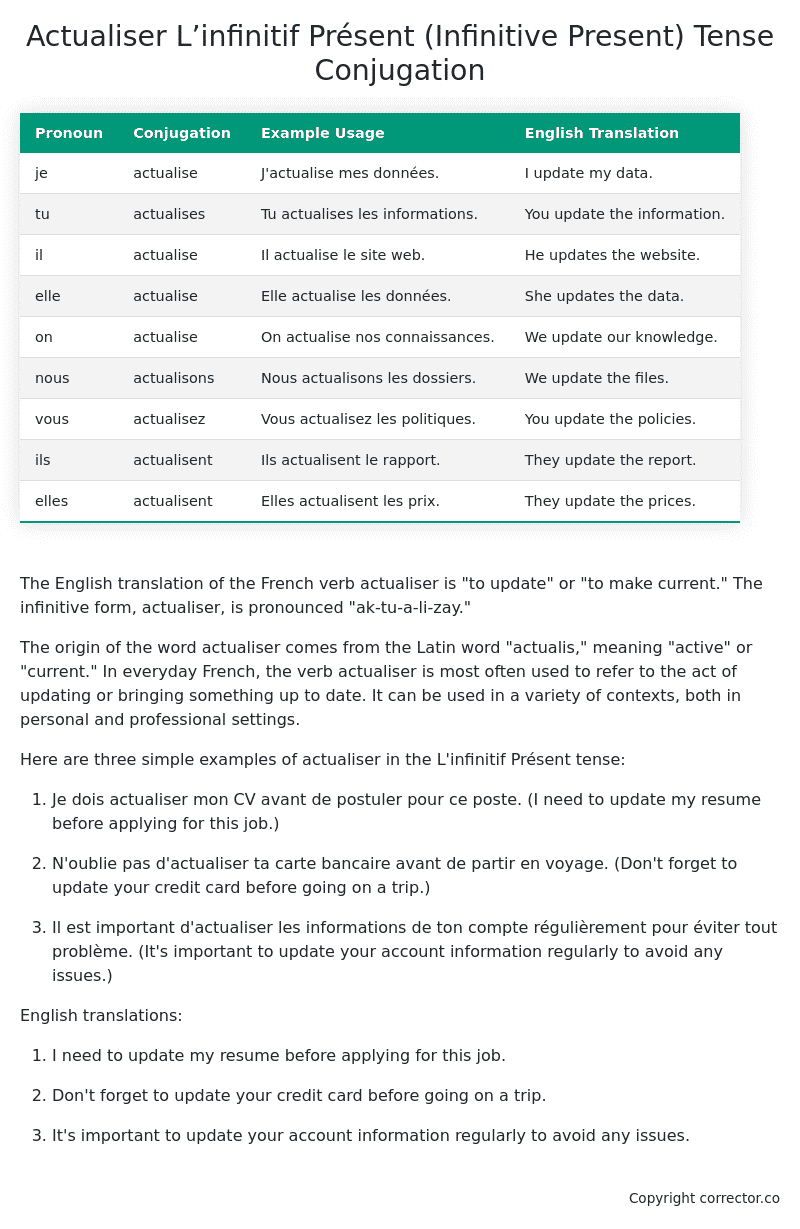L’infinitif Présent (Infinitive Present) Tense Conjugation of the French Verb actualiser
Introduction to the verb actualiser
The English translation of the French verb actualiser is “to update” or “to make current.” The infinitive form, actualiser, is pronounced “ak-tu-a-li-zay.”
The origin of the word actualiser comes from the Latin word “actualis,” meaning “active” or “current.” In everyday French, the verb actualiser is most often used to refer to the act of updating or bringing something up to date. It can be used in a variety of contexts, both in personal and professional settings.
Here are three simple examples of actualiser in the L’infinitif Présent tense:
-
Je dois actualiser mon CV avant de postuler pour ce poste. (I need to update my resume before applying for this job.)
-
N’oublie pas d’actualiser ta carte bancaire avant de partir en voyage. (Don’t forget to update your credit card before going on a trip.)
-
Il est important d’actualiser les informations de ton compte régulièrement pour éviter tout problème. (It’s important to update your account information regularly to avoid any issues.)
English translations:
-
I need to update my resume before applying for this job.
-
Don’t forget to update your credit card before going on a trip.
-
It’s important to update your account information regularly to avoid any issues.
Table of the L’infinitif Présent (Infinitive Present) Tense Conjugation of actualiser
| Pronoun | Conjugation | Example Usage | English Translation |
|---|---|---|---|
| je | actualise | J’actualise mes données. | I update my data. |
| tu | actualises | Tu actualises les informations. | You update the information. |
| il | actualise | Il actualise le site web. | He updates the website. |
| elle | actualise | Elle actualise les données. | She updates the data. |
| on | actualise | On actualise nos connaissances. | We update our knowledge. |
| nous | actualisons | Nous actualisons les dossiers. | We update the files. |
| vous | actualisez | Vous actualisez les politiques. | You update the policies. |
| ils | actualisent | Ils actualisent le rapport. | They update the report. |
| elles | actualisent | Elles actualisent les prix. | They update the prices. |
Other Conjugations for Actualiser.
Le Present (Present Tense) Conjugation of the French Verb actualiser
Imparfait (Imperfect) Tense Conjugation of the French Verb actualiser
Passé Simple (Simple Past) Tense Conjugation of the French Verb actualiser
Passé Composé (Present Perfect) Tense Conjugation of the French Verb actualiser
Futur Simple (Simple Future) Tense Conjugation of the French Verb actualiser
Futur Proche (Near Future) Tense Conjugation of the French Verb actualiser
Plus-que-parfait (Pluperfect) Tense Conjugation of the French Verb actualiser
Passé Antérieur (Past Anterior) Tense Conjugation of the French Verb actualiser
Futur Antérieur (Future Anterior) Tense Conjugation of the French Verb actualiser
Subjonctif Présent (Subjunctive Present) Tense Conjugation of the French Verb actualiser
Subjonctif Passé (Subjunctive Past) Tense Conjugation of the French Verb actualiser
Subjonctif Imparfait (Subjunctive Imperfect) Tense Conjugation of the French Verb actualiser
Subjonctif Plus-que-parfait (Subjunctive Pluperfect) Tense Conjugation of the French Verb actualiser
Conditionnel Présent (Conditional Present) Tense Conjugation of the French Verb actualiser
Conditionnel Passé (Conditional Past) Tense Conjugation of the French Verb actualiser
L’impératif Présent (Imperative Present) Tense Conjugation of the French Verb actualiser
L’infinitif Présent (Infinitive Present) Tense Conjugation of the French Verb actualiser (this article)
Struggling with French verbs or the language in general? Why not use our free French Grammar Checker – no registration required!
Get a FREE Download Study Sheet of this Conjugation 🔥
Simply right click the image below, click “save image” and get your free reference for the actualiser L’infinitif Présent tense conjugation!

Actualiser – About the French L’infinitif Présent (Infinitive Present) Tense
Forming the Infinitive Present
Common Everyday Usage Patterns
As a Verb’s Dictionary Form
After Modal Verbs
As an Imperative
In Infinitive Clauses
Interactions with Other Tenses
Present Tense
Future Tense
Conditional Tense
Passé Composé
Imperfect Tense
Subjunctive and Conditional Moods
Summary
Want More?
I hope you enjoyed this article on the verb actualiser. Still in a learning mood? Check out another TOTALLY random French verb conjugation!


